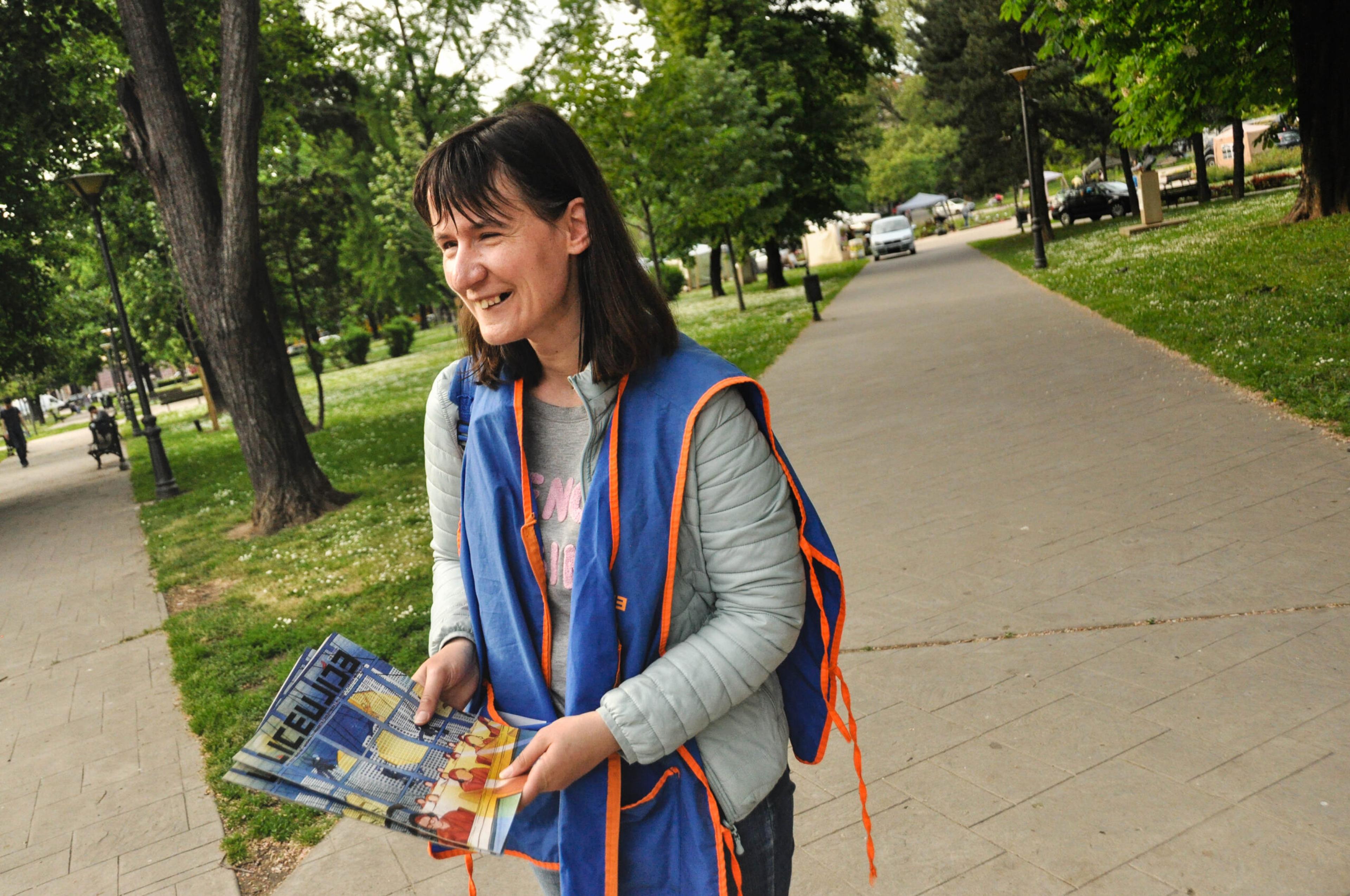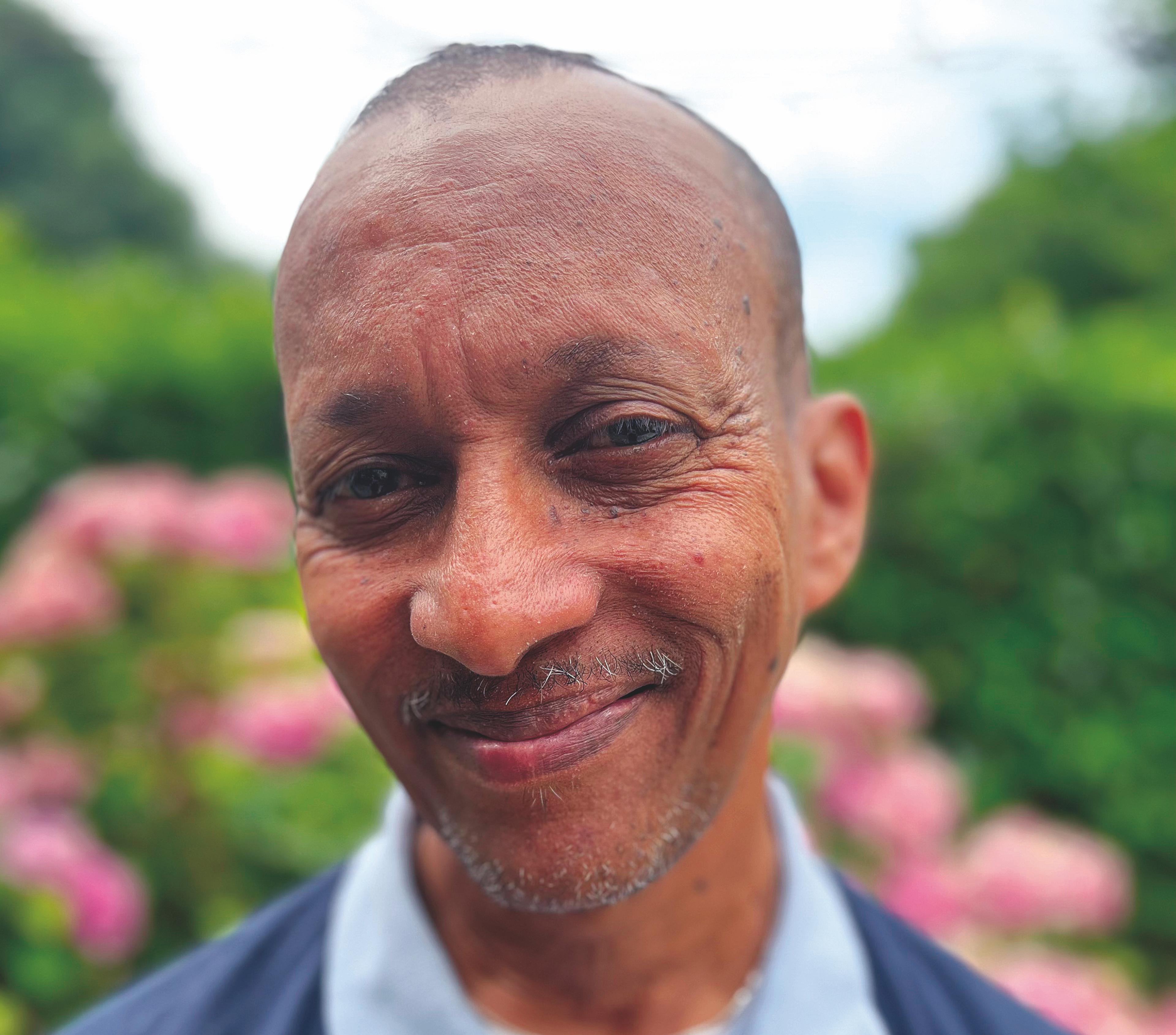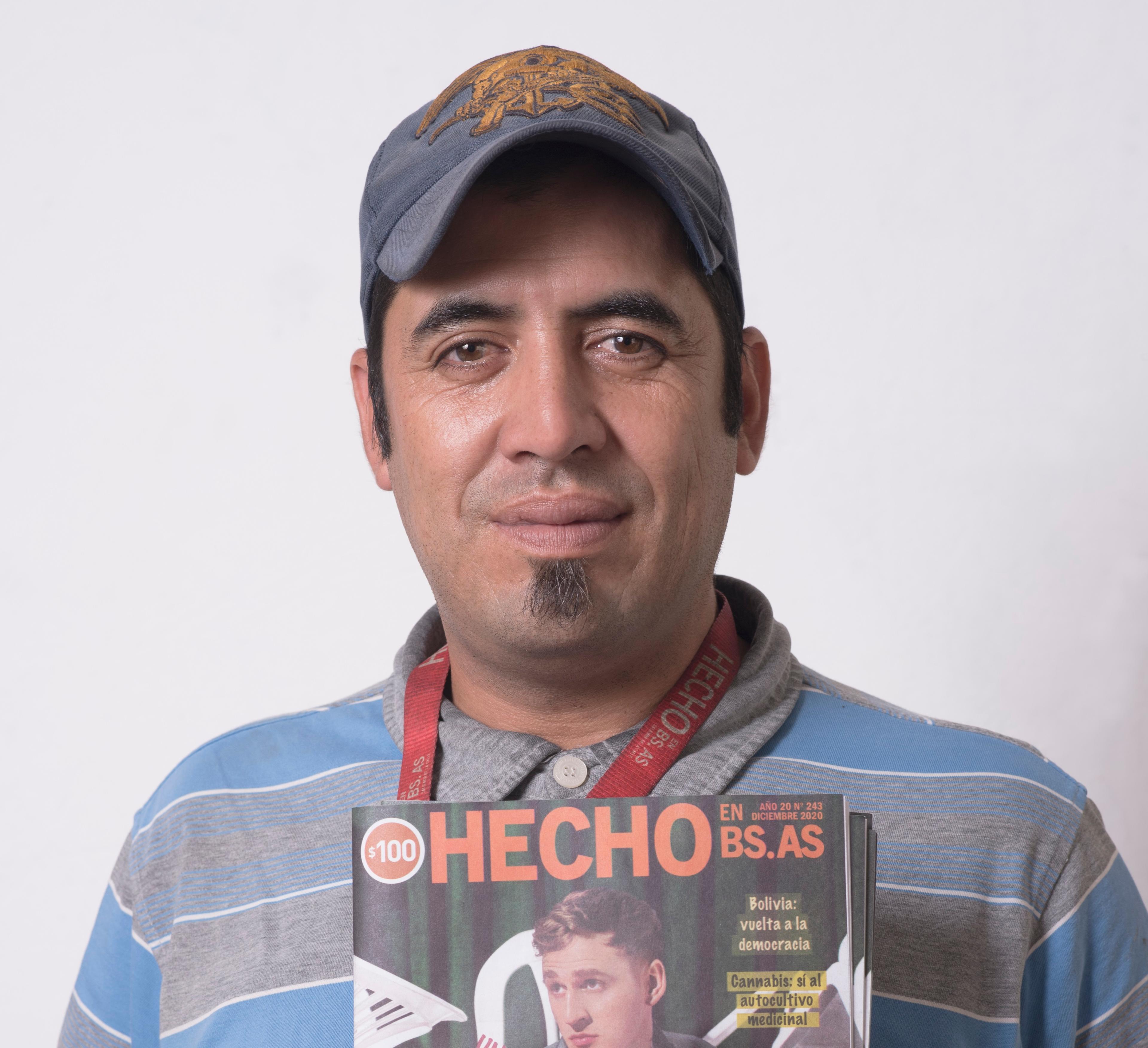The never-ending story of Faktum vendor Bertil Schöneman
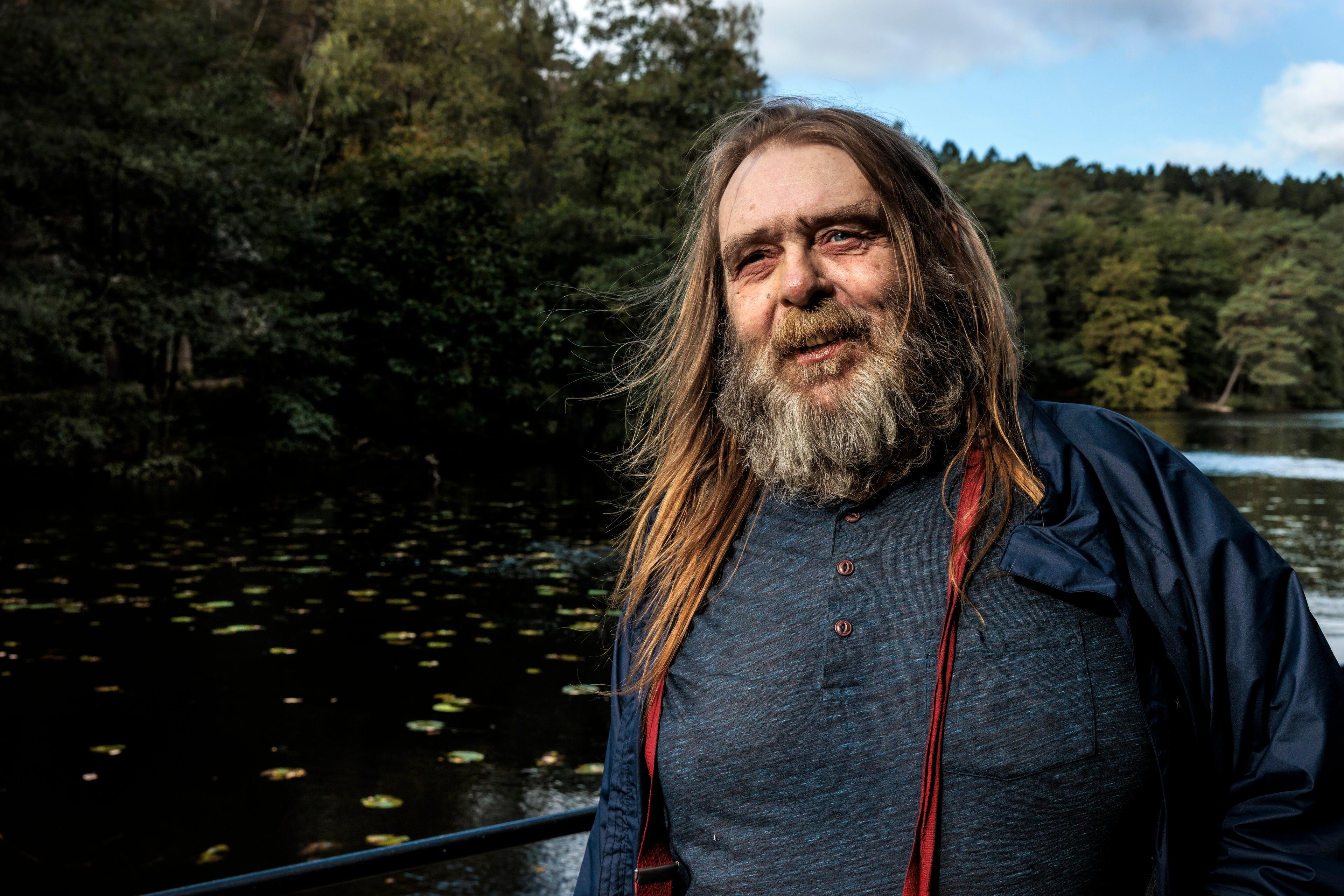
Emelie Asplund
Translated from Swedish via Translators Without Borders
Malin Clausson
- Vendor stories
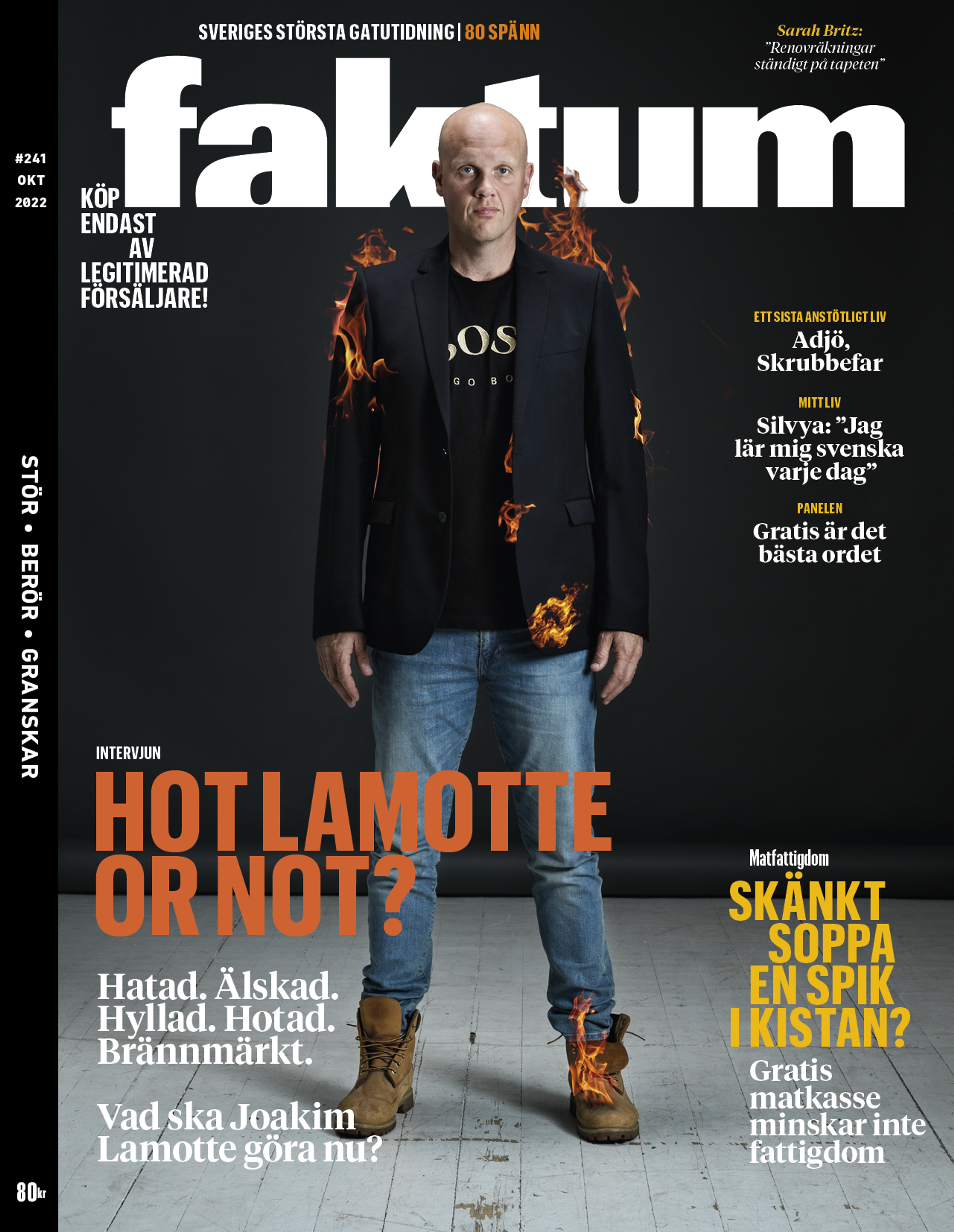
Please note, this article originally featured in Faktum, the Swedish street paper, and has been translated into English by Translators Without Borders.
Axel Bertil Roland Schöneman’s birth was dramatic – with hindsight, ridiculous. 66 years ago, he came into the world as the youngest of eight siblings, an afterthought, and he was born healthy – or almost, anyway. He had croup, it would later turn out, but that’s a story for another day.
The day Bertil was born was a whirlwind – certainly for his mother, Ellen, but also for his father, Oscar.
When it came time to go to the birthing centre in Uddevalla, Oscar, then a travelling salesman, threw aside a towel in the caravan in Rabbalshede where the family lived. The towel landed on the stove, and when the family returned with the newborn Bertil, the caravan and its contents had caught fire and burnt to the ground. Luckily, Bertil’s siblings were elsewhere.
Today, we can view the event as one of life’s many new starts for the Schöneman family, and unique among the stories Bertil tells with a smile on his face and a twinkle in his eye. Stroking his beard with satisfaction, he states that it wouldn’t be difficult to fill a book. But Bertil is not a writer.
The spoken word is Bertil Schöneman’s signature. Everyone who has ever met this Häcken supporter outside a stadium or shop, copies of Swedish street paper Faktum in hand, knows that.
On one of October’s windiest days, we take a trip through Hisingen to bring his strongest memories to life. It’s the annual Cinnamon Roll Day, but we forget to buy a bun, and at a pizza restaurant, Bertil Schöneman asks for a box – he can’t eat a whole pizza in the middle of the day; it’s not part of his routine.
But wandering around old landmarks on Hising Island is one of his favourite activities, alongside spending time with his siblings’ great-grandchildren and selling Faktum, which Bertil has been doing for 10 years now. Each magazine has a beginning and an end. But the story of Bus-Bertil, as Faktum staff call him, has no endpoint. The stories are stored in an unending well, ever ready to dip into to.
On Blåsvädergatan in Biskopsgården, Bertil recalls one of the first times he rode into a ditch. The cycle ride into the sharp curve in the steep downhill ended with a broken leg in a quarry, after a flight that could have cost the then-seven-year-old his life. A year-long hospital stay delayed his start of school.
He who remembers how another child looked at him in amazement as “the boy in plaster in the bed next door”. “Look, mum, that boy is dead,” he said. Bertil laughs about it now, but at the time, it was terrible. Bertil disliked school. He was clearly developmentally advanced – “I was born as a two-year-old” – but by his third year, he was already so restless that things could only go in one direction: out of the door.
A few blocks further up, where Blåsvädergatan meets Köldgatan, is a car park. Bertil points out the corner where he once had to hide from armed police who tried to chase Clark Olofsson out of an apartment where his mother lived.
“Clark’s sister was friends with my sister, and we often played up here. Then suddenly the police appeared and shouted at us to duck,” says Bertil, chuckling with delight. “Everyone knew that Clark wasn’t there. You don't run home to mum if you’ve just escaped from prison.”
Bertil lived with his mother, father, sister and brother on Värmegatan, just below Clark Olofsson’s mother’s house, and the third anecdote that he shares from this time and address is probably the one that hits the hardest: the tale of the New Year’s Eve firework that blew up the Schöneman family’s balcony decor.
“Dad had decided that we were going to celebrate the New Year properly and had bought a big firework. But he knew nothing about how to set it off and probably no one else in the area had had a rocket before. He attached it with a clamp to the balcony railing and that was that.”
There are a couple of other unpleasant anecdotes from this location, too. About Bertil’s sister’s best friend, who took her own life in Sjumilaskogen, and about his sister’s boyfriend, who died in a horrific workplace accident at Gothenburg’s bolt factory in Backaplan. “It was Friday, September 19, 1975, I’ll never forget that. He got caught in a lathe and was torn to pieces.” His sister was completely devastated.
The autumn sun shines over Vårvädertorg, where we make a short stop. Bertil points out the premises where his father ran a hot dog stand.
“I'll share a false rumour that the journalist Janne Josefsson spread about my father. Janne also grew up here, and he has said that it was best to buy your hot dog in the morning if you were to get what you wanted, because by the afternoon, the hot dog man was too drunk. That can’t be right, because my dad was almost never in the kiosk himself.”
Oscar owned the kiosk, but since he was, in Bertil’s words, somewhat workshy, it was mostly Bertil’s grandfather, a teetotal Salvation Army soldier, who worked there – “and mum, who also made the mashed potatoes, at home in our kitchen.”
If others would describe Bertil’s father as a drinker, Bertil himself would warmly say that he was “happy drinking”, but also spending time with his children.
“I had an as good a time as possible during these years, the hot dog stand was doing well, and no father was as involved as much as mine. He went with me to scouts, he started a hockey team, made sure we were allowed to participate in the GP-Pucken ice hockey tournament, and we both loved soccer.”
Bertil is a diehard Häcken fan but belongs to the generous kind of supporter who can also wish a team further down the table success. Gais football team has a special place in his heart, because during a period spent working at Gothenburg’s leisure administration, he helped to lay the lawn at the training facility Gaisgården.
It would be a few more years before he began experiencing panic attacks. Despite fatigue, he was okay at Bjurslätt school. He was often a guest at the “learning support clinic” from which he often ran away, but he remembers one teacher fondly. “He always found us and was firm, but fair.”
We park at Bjurslätttorg, where Bertil once lived – one of countless addresses in Hisingen that have borne the Schöneman name over the years. This one, like the others, holds specific memories: “This is where I lived the last time, I gambled away my apartment. I have gambled away my home three times: twice with money and once with music.”
An infinite number of follow-up questions could be asked here. But when we enter Bjurslätttorg and Bertil points out where his much-missed good friend and Faktum colleague lived, and the premises of the RSMH (National Association for Social and Mental Health), those details feel more interesting to ponder.
RSMH is a nationwide organisation with 140 local associations. In Bjurslätt, Bertil acted as chair for several years in the early 2000s. He was energetic and deeply committed, and spent his time raising awareness around mental illness, running a cafe, and arranging musical entertainment for his fellow association members, many of whom rarely left their own homes.
Most of Bertil’s adult life was blighted by recurring anxiety attacks, for which he was prescribed strong medication that led to alcohol and substance misuse, and eventually crime, unemployment and homelessness.
But his path to recovery also began in Bjurslätttorg with a dedicated doctor whom he calls Kalle, as well as some equally warm-hearted nurses at Bjurslätt medical centre. “I'm just going to pop in there and take a test,” he says.
Carina Nyström welcomes him. Laughter rings out, the warmth of humanity fills the room, and we understand that this relationship goes back a long way. “A few decades,” confirms Carina.
With both parents and many friends long dead and little contact with his siblings, the list of people Bertil is close with is dwindling. But he is grateful for the warm relationship he has with his niece and her children, grandchildren and great grandchildren. The Faktum office that Bertil visits several times a week to buy magazines, which he then sells outside Willys in Kungälv, receive frequent updates on their antics.
But when he speaks about his own childhood, with two full siblings and five half-siblings on his dad’s side, a couple of whom were older than Ellen, who was 28 years Oscar’s junior, he says that the siblings have different views of their upbringing.
“I think it’s because my older siblings had a tough time of it, and it was only when I was little that the family finances started to improve. As the late arrival, I got quite a bit more attention.”
When Oscar turned 65, his children presented him with a painting depicting of his life and his deeds, comprised of a single line criss-crossing the canvas, ending abruptly in the very bottom corner of the painting where it read: Bertil. “It was funny,” says Bertil, pointing out of the car window at Hisingehus where his dad’s party was held.
He admits that Oscar Schönman was a wolf in sheep’s clothing – hardly the dream son-in-law for Ellen’s parents, Salvation Army folk who worked at the Betelskeppet homelessness shelter, helping sailors addicted to alcohol.
“Mum came to Gothenburg in the 1940s with my grandma and grandpa and mum and dad met through the Salvation Army. They were all Salvation Army folk, and we went to church and were part of the Home Association, singing and praying and arranging raffles. So, whenever grandma and grandpa came round, dad had to hide all the booze,” says Bertil, shuddering at the thought.
We head back in time and park at Slättadamm. Bertil is very little – four years old, to be precise. One cold winter’s day, here in the sandpit outside the family home on Sockenvägen, it became abundantly clear that he was suffering from croup. A stern neighbour rang Ellen’s doorbell and asked in a harsh tone, “Is it a good idea for little Bertil to be sleeping in the sand pit?”
He was a sickly child beginning a life that would be shaped by physical and psychological illness, leading him to become addicted to medication that created new problems. Because a few years later, his adrenal gland began to act up and his aorta burst. Who could possibly survive such a blow? Luckily, Bertil was already at the hospital. For the next 10 years, “between the ages of 13 and 23, I was healthy,” Bertil smiles.
This was also the time when he was active in the Blåvingarna, the scout troop on Långströmsgatan, played in goal for the Häcken boys’ team, and went slalom skiing down the slope leading to S A Hedlunds park. “Ask me anything about S A Hedlund and I can tell you the answer,” says Bertil. We skip over the questioning and instead opt for a story about Häckenborg, which is located at the entrance to the park.
What was once the Häcken clubhouse, built in 1960 and paid for by the Swedish Heritage Fund, is now a Catholic church. Bertil was a frequent visitor in his teenage years and even went streaking here outside the Lundby clubhouse on more than a few occasions. He also briefly switched teams. “That was the only time my dad got mad at me. He didn’t talk to me for a fortnight,” he recalls.
This was also the time when the Schönemans had it best, at least in terms of their living situation. We are stood outside the house on Gamla Björlandavägen, which the Schöneman family moved into in 1967 when Bertil was 10. When they moved out, he was 16 and “had got into girls” and a fair amount of “mischief” that perhaps wasn’t always strictly legal.
“It was all good fun, though,” says Bertil. “What’s happening with the young people these days, the shootings and everything, it’s hard to wrap your head around it. I’m so glad to be 66 years old because I won’t be here in another 20 years. Where is the parental responsibility these days?”
I recall this comment later on when Bertil describes his parents once sending him, aged 14, to grab as many boxes of cream buns as he could carry after a bakery truck tipped over in the road outside their house as just another bit of fun. It’s all relative.
We photograph Bertil in the Faktum studio. A few delightful hours are livened up with more stories and, finally, cinnamon buns. With a bit of his favourite music over the speakers, Bertil, despite his fair share of aches and pains, gets into the groove and starts playing air bass to Motvind’s prog-rock Som i en dimma.
He looks back at the years he spent on the road, when he drove HGVs and tour buses and worked as a fixer for bands with names like Lady Jane and Snowstorm, through rose-tinted glasses, even though he knows they were not exactly peaceful and joyful. Too much booze, too many downers, the authorities on his tail and relationships that didn’t last.
He has enjoyed loving relationships, no doubt about it. But none that “stood out”. “I lived with one girl for a few years and another girl I was with, oh, I was so madly in love with her, she really had a wonderful love life. I just wasn’t a part of it,” he says with a wink and his unmistakeable guffaw.
He never had any children of his own, but his sister’s family satisfy his need to be there for someone else. Bertil manages to provide for them even though presents and activities are far from cheap these days, because he gets “so many tips” from his Faktum customers outside Willys in Kungälv.
He is doing well here. After work, he mostly enjoys a bit of alone time in Majorna, where he has been living for eight years. “I don’t want to go back to Sahlgrenska hospital,” he says – “not until it’s time to put me in the morgue.”
When that day does come, he suggests that his headstone read, “’He tried his best’ – a quote from Totta Näslund, from the song Six Feet Under.”
Despite his health, Bertil is positive about his life. He has learned a lot on his journey and has no complaints. I tell him that I am amazed by his positive attitude and am curious about what his secret is. Bertil smiles widely, as if he had been waiting for the question. “Well, dear, it’s because I’m a bit slow-witted.”
